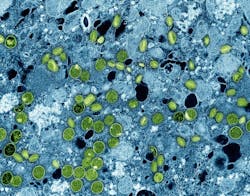Mpox vaccine is safe and generates a robust antibody response in adolescents
A National Institutes of Health (NIH)-funded clinical trial of an mpox vaccine in adolescents found it was safe and generated an antibody response equivalent to that seen in adults, according to a planned interim analysis of study data.
Adolescents are among the population groups affected by mpox in the current Clade I mpox outbreak. The interim results of this trial were presented at the IDWeek2024 conference in Los Angeles.
NIH’s National Institute of Allergy and Infectious Diseases (NIAID) is sponsoring a mid-stage study in the United States to evaluate the safety and immune response generated by two doses of MVA-BN in adolescents aged 12-17 years, comparing outcomes to those in adults aged 18-50 years. In a planned interim analysis, study investigators measured antibody levels two weeks after the second dose (study day 43) and monitored safety through 180 days after the second dose (study day 210). The analysis showed that the MVA-BN vaccine generated antibody levels in adolescents equivalent to those observed in adults at day 43 and found that the vaccine was well tolerated through study day 210. The overall frequency of adverse events was comparable between the study groups. Reports of dizziness were more common in adolescents than adults, but similar to the frequency of dizziness reported when other vaccines are administered in adolescents.
According to the study team, the interim data support the safety and quality of the immune response generated by the MVA-BN vaccine in adolescents, findings relevant to the United States and other areas where mpox cases have occurred.

